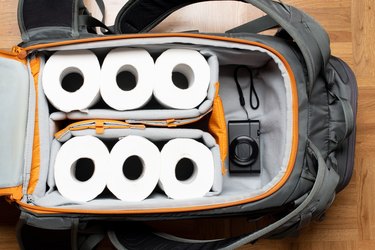
Traveler's diarrhea strikes as many as 60 percent of world travelers, making it the most common travel-related illness, according to the Centers for Disease Control and Prevention (CDC). More common, even, than its subtler cousin, traveler's constipation.
Like other types of diarrhea, it comes with loose stools and stomach cramps and can make you feel miserable, but it usually isn't life-threatening.
Video of the Day
Video of the Day
Sometimes called Montezuma's Revenge (after the last Aztec emperor in what is now Mexico), this type of upset stomach is more widespread in resource-limited regions, says Kalyani Meduri, MD, a gastroenterologist with AdventHealth Medical Group in Zephyrhills, Florida. That includes:
- Subsaharan Africa
- Central and South America
- The Middle East
- Parts of Asia outside Japan and South Korea
These are areas with warmer climates that often lack refrigeration and may have poor sanitation standards.
Here's what causes this type of diarrhea, and how to recognize, diagnose, prevent and treat it.
Causes of Traveler’s Diarrhea
Most cases of traveler's diarrhea are caused by bacteria, with Escherichia coli (E. coli) accounting for about a third of all cases, according to a StatPearls paper updated in July 2021. Other offending bacteria include Campylobacter jejuni (especially in Southeast Asia), while viruses such as norovirus, rotavirus and COVID-19 as well as parasites can also cause traveler's diarrhea.
The pathogens are typically transmitted through contaminated food and drink, says Niket Sonpal, MD, assistant professor of medicine at Touro College of Osteopathic Medicine in New York City.
Risk Factors
Traveler's diarrhea can affect anyone, but some factors make you more likely to get it:
- Being pregnant
- Being very old or very young
- Having a weakened immune system or chronic condition like diabetes
- Taking antacid or acid-blockers, as these deplete stomach acid, which would normally help kill the organisms
Symptoms of Traveler’s Diarrhea
Symptoms of traveler's diarrhea are no different from any other kind of diarrhea. They usually appear within four to 14 days of flying or any other type of travel, Dr. Meduri says, although the incubation period can be several weeks long in the case of certain parasites.
Signs of the condition include:
- Three or more loose or watery stools a day, which come on suddenly
- An urgent need to use the bathroom
- Stomach cramps
- Bloating and gas
- Loss of appetite
- Nausea and vomiting
- Fever
- Muscle pain
Diarrhea associated with COVID-19 will likely bring other telltale symptoms, like shortness of breath and coughing, Dr. Sonpal says.
Luckily, most people recover from traveler's diarrhea within a week, with the worst part lasting a day or two.
A small percentage of people with traveler's diarrhea go on to develop dehydration, according to the Mayo Clinic, which can lead to sepsis and kidney failure. Signs of dehydration include dark urine, dizziness, lightheadedness, weakness and feeling thirsty.
A few people with traveler's diarrhea go on to develop a form of irritable bowel syndrome with continued diarrhea, stomach cramping and bloating, per Johns Hopkins Medicine.
Diagnosing Traveler’s Diarrhea
Most cases of traveler's diarrhea go away on their own and don't need a diagnosis.
However, doctors can diagnose the condition based on your symptoms and travel history or, in more severe cases, by testing a stool sample, according to Johns Hopkins Medicine.
How to Prevent Traveler’s Diarrhea

Regardless of the cause or symptoms, preventing traveler's stomach boils down to two key practices: Washing your hands often and being very, very diligent with what you eat and drink, Dr. Sonpal says.
- Only drink water (and ice) from a bottle or that has been boiled for three minutes or longer. The same goes for water used to brush your teeth.
- Take care not to ingest any water while you shower.
- Stick to factory-sealed beer, wine, soda or juice, and steer clear of milk and other dairy products which may be unpasteurized.
- If you're traveling to an extremely remote region, consider taking a compact water filter, advises Dr. Meduri. Iodine and chlorine tablets will also disinfect water.
- If there's no way to wash your hands, use a hand sanitizer containing at least 60 percent alcohol.
- Stick to hot, cooked food as well as fruits and vegetables that you can peel yourself. Avoid raw foods, shellfish from contaminated water and food from street vendors and buffets.
- Antibiotics aren't recommended to prevent traveler's diarrhea. The best medicines to help ward off the condition include over-the-counter loperamide (Imodium) and bismuth subsalicylate (Pepto-Bismol), as long as you take them for less than three weeks. (Bear in mind that Pepto-Bismol can turn your stool and tongue black and can interact with certain medications.)
Treating Traveler’s Diarrhea
Most cases of traveler's diarrhea are mild and go away on their own, per the Cleveland Clinic.
In the meantime, you can help calm symptoms by drinking lots of fluids, including water, electrolyte solutions and Pedialyte for children. Oral rehydration solutions can be purchased or made with half a teaspoon of salt, six small spoons of sugar and one liter of clean water.
Other natural remedies for diarrhea include: eating plain foods high in soluble fiber (think: oats, apples, citrus fruits), nixing artificial sweeteners and avoiding caffeine and alcohol.
The same anti-diarrheal drugs that may help prevent traveler's diarrhea — Imodium and Pepto-Bismol — may help treat the condition. But keep in mind that you shouldn't use these meds if you have bloody stools; in that case, you should see a doctor ASAP.
Antibiotics such as azithromycin (Zithromax), ciprofloxacin (Cipro), doxycycline (Vibramycin) and rifaximin (Xifaxan) should only be prescribed by a doctor and reserved for more severe cases.
Related Reading
When to See a Doctor
Make an appointment with a doctor if:
- Your diarrhea doesn't go away after a week
- You have a high fever (103 F or higher for adults)
- You're vomiting so much that you can't keep down any food
- You have bloody stools
- You're feeling lightheaded or dizzy, or have dark urine or aren't urinating frequently (these are signs of dehydration, which can be dangerous)
- Centers for Disease Control and Prevention: “Travelers’ Diarrhea”
- Johns Hopkins Medicine: “Traveler’s Diarrhea”
- StatPearls: “Travelers Diarrhea”
- Mayo Clinic: “Traveler’s Diarrhea”
- Cleveland Clinic: “Traveler’s Diarrhea”
- Medical Clinics of North America: “Traveler’s Diarrhea”
- Merck Manual: “Traveler’s Diarrhea”
- Penn Medicine: “Travelers Diarrhea”
- Centers for Disease Control and Prevention: “Choose Safe Food and Drinks When Traveling”
Is this an emergency? If you are experiencing serious medical symptoms, please see the National Library of Medicine’s list of signs you need emergency medical attention or call 911.